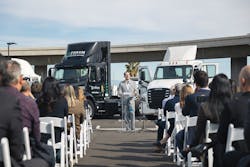Port of Long Beach Launches FM Harbor EV Charging Depot
The Port of Long Beach celebrated the launch of FM Harbor this week, a new electric vehicle charging depot.
FM Harbor will support more than 200 electric drayage trucks each day. Drayage trucks are the large, heavy-duty semi-trucks that move shipping containers within a port.
"FM Harbor is a state-of-the-art facility designed to support California's ambitious transition to zero-emission transportation. With 9 MW of power, 44 fast-charging stations, and the capacity to charge over 200 trucks per day, this project is a game-changer for the drayage community and a significant step toward a sustainable future," said Laura Renger, executive director of the California Electric Transportation Coalition, a nonprofit that supports the electrification of transportation.
FM Harbor was built by Forum Mobility, a heavy-duty truck charging infrastructure provider that is currently developing depots in ports and along typical freight routes across southern California.
The company says its Long Beach facility is the largest port-based truck charging depot in the U.S.
Energy Value: New Imperative in Assessing C&I Real Estate
Read a New Ask the Expert with Generac
"Forum Mobility has proven that heavy-duty electric trucking is ready to scale using FM Harbor as a replicable model,” Danya Hakeem, vice president of portfolio for Elemental Impact, said in a statement.
Elemental Impact is a nonprofit investor fund that covered some of FM Harbor’s development costs, including permitting and engineering design fees.
Making electric drayage vehicles more accessible
Forum Mobility also announced this week that it will collaborate with Climate United to provide affordable electric truck leasing options to small fleets at the Ports of Los Angeles and Long Beach.
"Electric drayage trucks cost less to operate, but high upfront costs make it difficult for independent owner-operators and small fleets to go electric," said Beth Bafford, CEO of Climate United.
Using grant funds from the Environmental Protection Agency, Climate United will invest up to $250 million to purchase up to 500 Class 8 electric trucks. It is unclear if and how President Trump’s recent freezing of IRA grants will impact these grant funds.
"FM Harbor is a great example of what's possible in zero emission freight,” said Matt LeDucq, CEO and co-founder of Forum Mobility. “With a state-of-the-art charging facility right where it's needed along with our affordable Class 8 electric truck leasing program, we are eliminating the barriers to achieving zero-emission freight. Truckers can enjoy lower costs per mile without upfront expense, cargo owners can choose to have their goods shipped without emissions, and communities can breathe easier.”
The Port of Long Beach is going green
This is not the first electrification effort to take root at the Port of Long Beach. In 2022, Schneider Electric broke ground on a $12.2 million microgrid project designed to provide reliable, zero-emissions electricity for the port’s Joint Command and Control Center.
Toyota opened a renewable-powered logistics facility at the port last year that leverages FuelCell Energy’s Tri-gen system to produce renewable electricity, renewable hydrogen and usable water.
Additionally, Prologis and Performance Team, a Maersk Company, launched a heavy-duty electric vehicle (EV) charging depot near the Ports of Los Angeles and Long Beach that is powered by one of the nation's largest EV truck microgrids.
About the Author
Kathy Hitchens
Special Projects Editor
I work as a contributing writer and special projects editor for Microgrid Knowledge and sometimes EnergyTech. I have over 30 years of writing experience, working with a variety of companies in the renewable energy, electric vehicle and utility sector, as well as those in the entertainment, education, and financial industries. I have a BFA in Media Arts from the University of Arizona and a MBA from the University of Denver.

